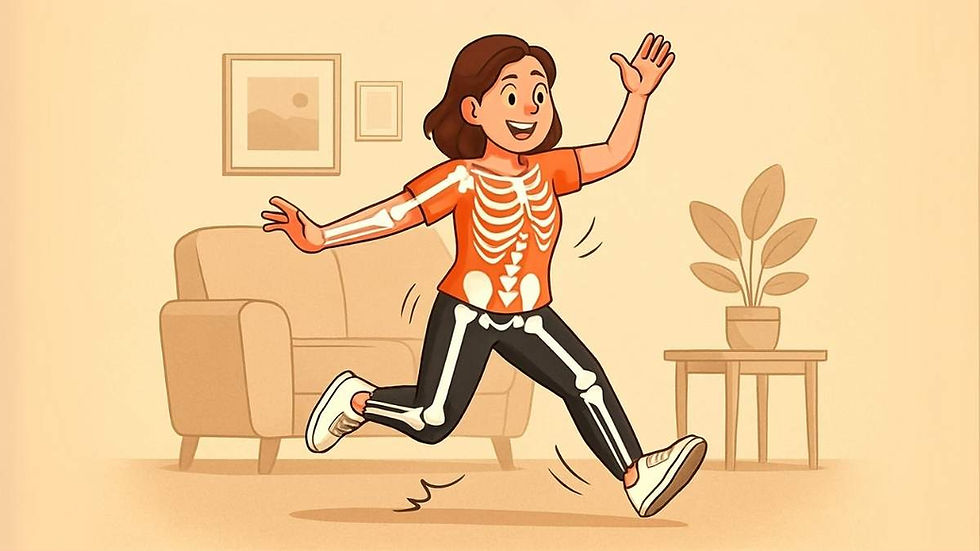Strong Bones Can Prevent Serious Injuries From Falls
- Elder Love USA
- Aug 5, 2025
- 3 min read
Falls are a leading cause of injury for older adults, and while healthy bones can't always prevent a fall, they can make a huge difference in preventing serious injuries like fractures.

Why Bone Health Matters in Fall Prevention For Older Adults
When we talk about fall prevention, the health of your bones is crucial. Strong bones act as a protective barrier, helping to prevent serious injuries when you fall.
However, as we age, bone health can become a concern.
One major concern is Osteoporosis, a condition that weakens bones and makes them more fragile and prone to fractures.
The challenge with osteoporosis is that it often doesn’t show symptoms until it’s too late. Many people don’t realize they have it until after a fall results in a fracture.
Key Ways to Keep Your Bones Strong and Healthy
Get Enough Calcium and Vitamin D
Calcium is a vital mineral for maintaining strong and healthy bones
Recommended Daily Intake:
Men (Age 51 and older):
Men aged 51-70 need 1,000 mg of calcium each day.
Men aged 71+ need 1,200 mg of calcium each day.
Do not exceed 2,000 mg per day.
Women (Age 51 and older):
Women aged 51+ need 1,200 mg of calcium each day.
Do not exceed 2,000 mg per day.
Good Dietary Sources of Calcium:
Dairy products (milk, yogurt, cheese)
Green leafy vegetables (broccoli, kale—avoid spinach due to oxalates that reduce calcium absorption)
Calcium-fortified foods (like fortified orange juice or plant-based milks)
Nuts, such as almonds
Fish with edible bones (like sardines)
Vitamin D is crucial for helping the body absorb calcium from food effectively.
Recommended Daily Intake:
Men (Age 51 and older):
Men aged 51-70 need 15 mcg (600 IU) of vitamin D daily.
Men aged 71+ need 20 mcg (800 IU) of vitamin D daily.
Do not exceed 100 mcg (4,000 IU) per day.
Women (Age 51 and older):
Women aged 51-70 need 15 mcg (600 IU) of vitamin D daily.
Women aged 71+ need 20 mcg (800 IU) of vitamin D daily.
Do not exceed 100 mcg (4,000 IU) per day.
Good Dietary Sources of Vitamin D:
Fatty fish (like salmon, mackerel, and sardines)
Fish liver oils
Fortified milk and dairy products
Fortified cereals
Stay Active with Weight-Bearing and Muscle-Strengthening Exercises
Regular exercise not only helps keep your bones strong but can even increase bone density. Weight-bearing activities like walking, jogging, tai chi, and low-impact aerobics put stress on your bones, helping them grow stronger. Muscle-strengthening exercises also build muscle mass, which helps support your bones and improves stability, reducing fall risk.
Avoid Smoking and Limit Alcohol
Smoking reduces the blood supply to the bones, limiting the flow of oxygen and nutrients needed for bone maintenance and repair. The nicotine in cigarettes also slows the production of osteoblasts, the cells that build new bone, leading to weaker bones over time.
Additionally, smoking decreases the body's ability to absorb calcium, which is crucial for bone strength and other important functions.
Alcohol weakens bones primarily by interfering with the process of bone remodeling, where
old bone is broken down and replaced with new bone. Chronic alcohol consumption disrupts this delicate balance, leading to a decrease in bone density.
Moreover, alcohol can also prevent calcium and vitamin D absorption making it harder for bones to stay strong.
5. Maintain a Healthy Weight
Being underweight increases the risk of bone loss and fractures, while being overweight puts extra stress on bones and joints. Aim to maintain a balanced weight through a healthy diet and regular exercise.
Remember, strong bones alone won’t stop all falls, but they play a key role when combined with improving balance, strength, and home safety. These strategies can help significantly reduce the risk of debilitating injuries.




Comments